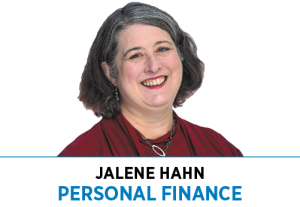Subscriber Benefit
As a subscriber you can listen to articles at work, in the car, or while you work out. Subscribe Now As part of the summer office cleanup, I came across an old book (1997) titled, “Women’s Guide to Financial Self-Defense,” by June Mays. This book came out of her experiences as a financial adviser to women who were “left financially clueless after the death of their husband” and “were victimized by men and by their own ignorance.” Financial self-defense is about increasing your financial literacy and confidence in making sound money decisions and is not just for women.
As part of the summer office cleanup, I came across an old book (1997) titled, “Women’s Guide to Financial Self-Defense,” by June Mays. This book came out of her experiences as a financial adviser to women who were “left financially clueless after the death of their husband” and “were victimized by men and by their own ignorance.” Financial self-defense is about increasing your financial literacy and confidence in making sound money decisions and is not just for women.
Some common reasons for not participating in financial decisions include, “I don’t understand how it works,” or, “I really don’t care or want to learn.” My favorite is, “I don’t need to understand; my spouse takes care of that.”
There are things in life that we don’t enjoy or might not be good at. For example, I don’t know how or like to catch fish, but I know enough about fresh fish to be able to select one for dinner or to know when one is a “little fishy” and might make my family sick. Financial self-defense is also about knowing enough to ask questions and not take statements at face value.
These self-defense concepts and tactics apply to someone from any demographic, but they are particularly important for women because of the obstacles women still face in securing a sound financial foundation. These obstacles include the fact that women have lower lifetime earnings than men, on average live longer than men and in general do not have the same access to financial education tools as men.
Because women will typically outlive their spouse, get divorced or never marry, they will have sole financial responsibility for years. In the case of widowhood, they need to be prepared to take care of their finances for 15 to 25 years. Kathleen M. Rehl, financial planner and author who works with widows, observed that, in times of transition, “Sometimes a widow’s grief can lead to ‘brain freeze.’” Being in an emotional fog can make you more vulnerable to unscrupulous financial salespeople and lead you to make poor decisions.
Whatever your situation, here are some things to do to protect yourself and your finances.
◗ Look at spending habits and create a budget. If you don’t know how much is coming in and how much is going out, it’s easy to spend beyond your means and get into debt. We have a habit of underestimating what we spend, so tracking spending is imperative.
◗ Create savings goals. Decide how much you personally need in an emergency fund. Set aside money for those “lumpy” spending months—for example, back to school, property taxes, holidays, vacations.
◗ Pay close attention to the big three: housing, transportation and education. Don’t focus on monthly payments; take a holistic view of total cost of ownership. This is where most people fall for sales practices that are usually not transparent and are sometimes outright deceptive. Do your homework and know your budget before you go shopping.
◗ Anticipate those “life didn’t go as planned” instances: death, divorce, unemployment and medical expenses. Insurance can help mitigate death and medical expense. To mitigate financial losses due to divorce or unemployment, choose a life partner carefully and maintain your human capital, or your ability to earn.
◗ Seek an objective review of your finances when you are going through transitions. Family or friends might give you advice without knowing your entire situation. Rehl recommends that you practice saying, “Thanks for your suggestions. I’ll take your ideas into consideration, but it’s way too early for me to decide what my future will be.”
It can be scary to learn new skills, and the financial services industry does not make it easy to understand financial concepts or terminology. Overall, it is really simple: Spend less than you make, save for the future, be skeptical when making purchases, and find a professional who pays attention and understands your goals and then ask for clarification when you don’t understand.•
__________
Hahn is a certified financial planner and owner of WWA Planning and Investments in Columbus. She can be reached at 812-379-1120 or [email protected].
Please enable JavaScript to view this content.
